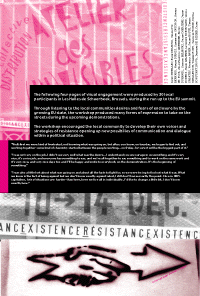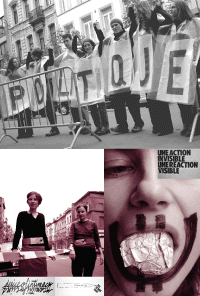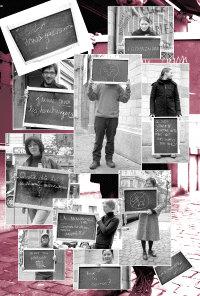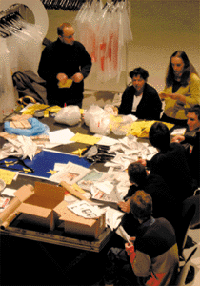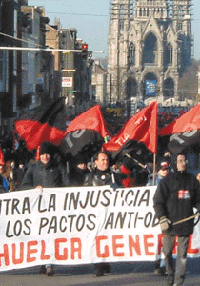

|
In Brussels, during the anti-EU demonstrations in December 2001 we came together to organise a workshop involving the local community, artists and students in creating banners, props, puppets, etc for the streets. We were given a massive space in the 'Halles de Schaerbeek' in which to work and invite participation. We worked for a week, discussing, making and distributing printed material. Alongside this we produced a Newspaper - 10,000 visual arguments - to be given away throughout the week's events. (See below for sample pages.) |
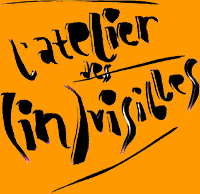 |
|
Introduction text Art in our societies stands for the individual, for subjectivity: it's the opposite of organized party politics and propaganda. Which is fine for us, because we don't believe in political parties as they're organized today, and we don't want to produce propaganda. What passes for art in the multimedia economy of contemporary society is something that constantly borders on visual enter-tainment, the endless production of new attractions, novelty for novelty's sake. We want to create situations where you talk to people who talk back. Situations where the ears are as important as the eyes, where the written word and image get left behind in the coversation. The thing is just to find a social and political twist in artistic creativity, to set artistic processes at work in a group or a social and political movement, to turn originals into multiples, or multipliers. |
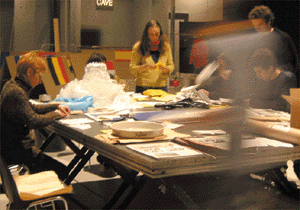
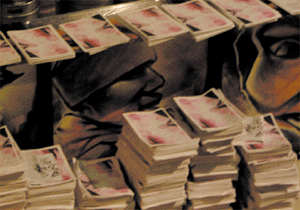
|
All You Ever Wanted to Know About Globalization (But They Were Afraid You'd Ask) Just two pictures are worth a thousand riots. The second image is a photograph taken in the financial district of London just two years ago, on June 18th, 1999. It shows naked protest, a man stripped of all arms and armor, nude humanity in the midst of capital's abstraction. But this man who risks nudity carries a sign. With language he gives a symbolic dimension to his nakedness, he makes a political demand: the inclusion of soft humanity in a world dominated by hard cash. This naked man brings hisbody and his intimacy into play on the street, in the public space, in order to symbolize a common struggle, potentiallythat of all mankind. And that's what we learn from each other, that's what we teach each other at every stage of the movement against neoliberal globalization. Planetary popular education: the struggle of a naked man distilled into a human sign. The notion of popular education evokes the period just after World War II, when workers and peasants in the industrialized societies gave themselves the intellectual, cultural and political tools they neededto share in the creation of new social institutions, and to contest the manipulation of thoseinstitutions by state capitalism. But if we can speak today about a planetary popular education, it is because industrial workers and peasants, but alsointellectual and cultural workers in the fully modernized societies, are in the process of giving themselves the tools we all need to contest the order of global neoliberalism, with the wars it is inevitably unleashing on a world scale To confront this neoliberal order, and to render its invisible governance finally visible to the public eye, everyone will need his naked humanity, everyone will need to involve herself personally, bodily, in a great movement of movements woven of hundreds and thousands of protests across the earth. But for this movement of movements to grow, everyone must also signify their personal involvement, share it across the dividing lines, express it with reasonedcritiques, cultural creations, radically renewed political formations. Everyone's humanity must learnto spell out the letters of a specific political demand - while reading what's written on the other's sign. (text from the opening page of the newspaper) |
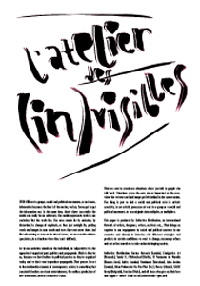
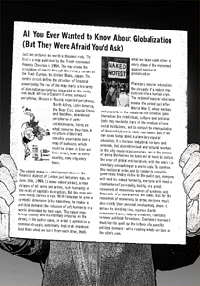
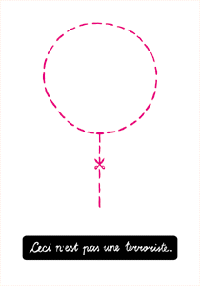
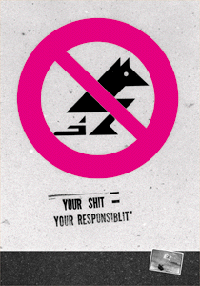

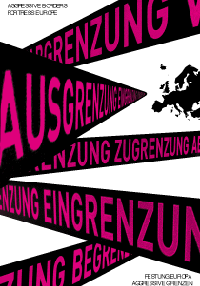
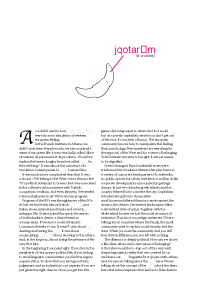
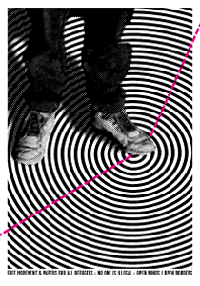
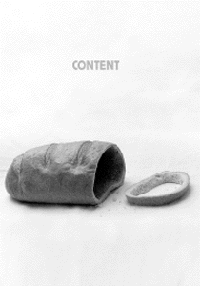
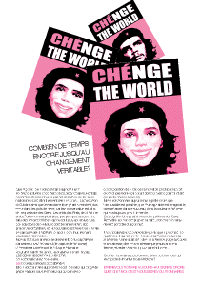
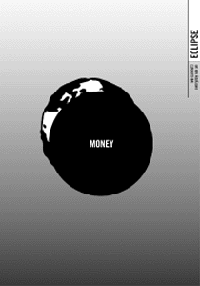
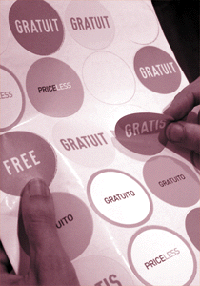
|
Kpouaaáv [fr: croissant] It was much more complicated than that. It was a choice. ÇWe belong to
the WestÈ was a famous late 70's political statement in Greece. East was
associated in the collective subconscience with Turkish occupation, tradition,
and even lazyness. We needed a less metaphysical rule. We've chosen progress. Progress of the 80's was the nightmare of the 90's. At last we had fresh, almost french [croissant], nice italian shoes, international banks and a hectic, unhappy life. Greece joined Europe in the search of individualistic desire, a desire based on consumerism. It became a social statement: I consume, therefore I am. It wasn't only about [croissant] desiring and tasting the [croissant]. It was about accumulating [croissant]. About showing to the others. And, in the long run, about losing the pleasure of the very first bite. In the beginning it sounded right. If you live in the peripherie of ÇeuropeanÈ political life, if you belong to small linguistic communities, you feel the urge to acquire status. To show that you have good taste, judgement and an inclination to prosperity if you are just given the right chance. Once you get into this game of proving equal to others (not in a social but in a purely capitalistic sense) you don"t get out of the race. It's a matter of honor. The european community knows how to manipulate this feeling. Basic psychology. New members are searching for the approval of the West and for a sense of belonging. To be Western it means to be right. It almost means to be dignified. Greece changed. Rural residential areas were tranformed into business districts that play home to a variety of corporate headquarters. No sidewalks, no public spaces but urban wastland; or million dollar corporate developments surrounded by garbage dumps. In just two decades greek islands and the country learned how to imitate the city. Capitalism intruded abruptly into the smallest rural house and altered the micro environment, the dreams, the desires. Devastated landscapes reflect a devastated state of mind. Together with the white island houses we lost the social structure of resistence. This is not a nostalgic statement. We are talking about countries where the family, the small community used to replace social security and the state. When you lose the community and you still face state indifference you are left with nothing. The dilemma is deeply political: How can we chose a life, ideas, ethics and a new sense of belonging? Afirst idea would be to step out of this very well shaped egocentric reality that was created for us and share our [croissant]/baguette/brot/psomi with others. And we are not talking about the [croissant] here. We are talking about the concept of the [croissant]; about the ideas, fears and misconceptions that lead us to false desires. (text from one of the pages) below distribution |
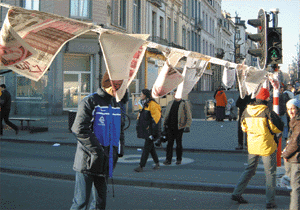
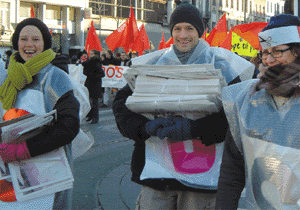
|
The following four pages of visual engagement were produced by 30 local participants in Les Halles de Schaerbeek, Brussels, during the run up to the EU summit. Through listening to the local communities desires and fears of enclosure by the growing EU state, the workshop produced many forms of expression to take on the streets during the upcoming demonstrations. The workshop encouraged the local community to develop their own voices and strategies of resistance opening up new possibilies of communication and dialogue within a political situation. Anne SEVELLEC, Eline DELHOUX, Charlotte BERNARD, Marine DUBOIS, Clementine CAUDRON, Audrey DE FOOZ, Jean-Francois LECRENIER, Bruno DUHAMEL, Sabrina BELHOURI, Julien DOERJENE, Julien DONEUX, Marie LELUBRE, Laurence NIEUWLAND, Gemma SABATES, Nicholas ANGER, Julien HOSTE, Teresa SDRALEVICH, Virginie MONU, Caroline VOISIN, Svetla KONSTANTINOVA, Delphine DE RIDDER, Diane MARIAGE, Mike LAMY, Greg AVAV, Mathieu CREED, MADS, Jofroi AMARSH, Pauline BEAUDEMONT, Marie-jo, Frederique FOURDIVIER, 30 splendides, EKSE TH.C..... merci to halles de schaerbeek and all the ones who gave us support in these days |
